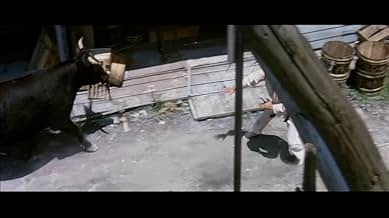Füge eine Handlung in deiner Sprache hinzuThis movie is based on the true life story of a Korean fighter named Choi Bae-dal (who later changed his name to Masutatsu Oyama), the founder of Kyokushin Karate in Japan.This movie is based on the true life story of a Korean fighter named Choi Bae-dal (who later changed his name to Masutatsu Oyama), the founder of Kyokushin Karate in Japan.This movie is based on the true life story of a Korean fighter named Choi Bae-dal (who later changed his name to Masutatsu Oyama), the founder of Kyokushin Karate in Japan.
Handlung
WUSSTEST DU SCHON:
- WissenswertesThis movie is based on the true life story of a Korean fighter named Choi Bae-dal (who later changed his name to Masutatsu Oyama), the founder of Kyokushin Karate in Japan. Choi was born in South Korea in 1923, immigrated to Japan in 1938, and founded the Kyokushin Karate organization in 1953. Currently, Kyokushin Karate is practiced by more than 12 million practicioners in over 120 countries around the world.
- Alternative VersionenUS "Champion of Death" version is cut by roughly 5 minutes. This mainly includes the "Gardening With Oyama" montage around the hour mark, as well as a few snippets when Oyama is told to return to Tokyo and continue his Karate training. However, there was also one brief cut in the finale to avoid an X rating, when Oyama pierces a henchman's head through his mouth with a bo staff. Despite the cut, due to a mastering error, the audio of the deleted shot can still be heard as Oyama disarms a gunfighter.
- VerbindungenFeatured in Der Bote (1986)
Ausgewählte Rezension
Mas Oyama was the most successful karate master of the late 20th century. He rejected the "training" of the karate clubs of the time focusing on an intense no holds form of training. He eventually built his system into a huge business empire with hundreds of schools across the world, without compromising his teachings. The testing in the Kyokushin schools are still some of the most physically challenging tests any martial art school requires. One non- physical hardship Oyama faced was prejudice due to his Korean ancestry and he spent time proving that loyalties were to Japan and Japanese Karate. This movie series was part of that effort although anyone who had the chance to meet Oyama (I did) would never question his allegiance to Japan. In this series, Oyama's most famous student, Sonny Chiba, is called upon to portray his master.
Oyama arrives from the countryside where he has been training alone. He challenges and makes short work of the established Karate schools he encounters. Disgusted by the state of karate, Oyama returns to his lone training. He eventually picks up a student, falls in love and gets in the way of gangsters who are allied with the established karate schools. In the middle of this is the legendary bullfight with a mad bull. How much of the film is true is questionable.
That Oyama could kill a bull with his bare hands is true. He was called on to repeat this feat numerous times. There are filmed instances of Oyama actually doing this, although sometimes the bulls seemed to be tethered as Oyama was getting on in years. Sonny Chiba portrays his master with conviction and the karate is quite good. Chiba may not have been the best karate practitioner but, at this point in time, he was certainly above average.
As a whole the movie is good, much better then most martial art films in the drama department. I always wondered why it's not more well known. Possibly it the very realistic depictions of martial arts. People are shown getting tired and hurt unlike 99% of action film where the hero is a limitless fountain of energy and each blow instantly dispatches an opponent to death. Chiba seems so exhausted at one point that it hurts to watch. Perhaps viewers rather not have their entertainment reflect reality so closely.
Recommended especially for martial artists.
Oyama arrives from the countryside where he has been training alone. He challenges and makes short work of the established Karate schools he encounters. Disgusted by the state of karate, Oyama returns to his lone training. He eventually picks up a student, falls in love and gets in the way of gangsters who are allied with the established karate schools. In the middle of this is the legendary bullfight with a mad bull. How much of the film is true is questionable.
That Oyama could kill a bull with his bare hands is true. He was called on to repeat this feat numerous times. There are filmed instances of Oyama actually doing this, although sometimes the bulls seemed to be tethered as Oyama was getting on in years. Sonny Chiba portrays his master with conviction and the karate is quite good. Chiba may not have been the best karate practitioner but, at this point in time, he was certainly above average.
As a whole the movie is good, much better then most martial art films in the drama department. I always wondered why it's not more well known. Possibly it the very realistic depictions of martial arts. People are shown getting tired and hurt unlike 99% of action film where the hero is a limitless fountain of energy and each blow instantly dispatches an opponent to death. Chiba seems so exhausted at one point that it hurts to watch. Perhaps viewers rather not have their entertainment reflect reality so closely.
Recommended especially for martial artists.
Top-Auswahl
Melde dich zum Bewerten an und greife auf die Watchlist für personalisierte Empfehlungen zu.
Details
Zu dieser Seite beitragen
Bearbeitung vorschlagen oder fehlenden Inhalt hinzufügen






















